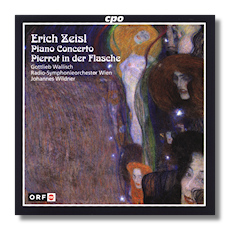
The Internet's Premier Classical Music Source
Related Links
- Latest Reviews
- More Reviews
-
By Composer
-
Collections
DVD & Blu-ray
Books
Concert Reviews
Articles/Interviews
Software
Audio
Search Amazon
Recommended Links
Site News
 CD Review
CD Review
Erich Zeisl

- Piano Concerto
- Pierrot in der Flasche: Ballet Suite
Gottlieb Wallisch, piano
Vienna Radio Symphony Orchestra/Johannes Wildner
CPO 777226-2 DDD 62:49
My God, this is wild stuff. Zeisl's music sounds at once naggingly familiar, and like a combination of ingredients not even a crazy musical chef could have imagined.
Zeisl (1905-1959) was one of many Austrian Jews who left their homeland in the 1930s and came to the United States. Like another Erich – Erich Wolfgang Korngold, that is – Zeisl eventually found work in Hollywood, providing music for motion pictures. Korngold worked on a decidedly better class of movies, however, while Zeisl's most famous achievement was a decidedly fictionalized (and not forgotten) stage-show about Tchaikovsky. In 1946, Zeisl also wrote music for The Postman Always Rings Twice, but received no screen credit for it. Five years later, he scored Abbott and Costello Meet the Invisible Man! His pupils included Jerry Goldsmith, whose work as a film composer quickly eclipsed Zeisl's.
Around the time that he was supporting the screen antics of Abbott and Costello, Zeisl was composing his Piano Concerto, probably his largest "absolute" work. (He composed a great deal of music for voice, and ballets too.) The concerto remained unperformed until 2005; this recording (with different musicians) was made a year later. It has a striking opening in which both the piano and the strings sing an expansive melody with an almost pentatonic feel. The second movement reminds me, with its chiming chords and plaintive melody, of the parallel movement in Górecki's Third Symphony. The third movement begins with a long, imposing introduction for the soloist, and then the orchestra launches into an angular dance, which the piano soon joins. Zeisl's inspiration never flags, and the writing for piano is very idiomatic. Furthermore, the concerto maintains an interesting ambiguity of mood throughout. One is never quite sure whether to smile or grimace, and whether one has been transported to the Middle East, or to a falafel restaurant in downtown Hollywood. With his strong technique and passionate temperament, Gottlieb Wallisch gives the concerto its full Romantic due.
Pierrot in der Flasche (Pierrot in the Bottle) is one of Zeisl's several ballets. This one dates from 1929. Again, the ballet remained unproduced in Zeisl's lifetime, although the suite presented here was heard in 1935. This is its first recording, however. The story is a jazz-age love triangle involving a flapper, her husband, and her lover, and the central section of the ballet is a fantasy. (In one scene, the cuckolded husband menaces his sleeping wife with vampire bats!) The score is even more eclectic than the Piano Concerto. Echoes of Glière, Mahler, and Korngold flirt with Chinese cakewalks and the ghosts of Negro spirituals, all of it brilliantly orchestrated and full of melodic interest. If you drowse off during this crazy score (unlikely!) you'll have very odd dreams.
The performances are great. Wildner throws himself into the task, obviously enjoying the wonderful weirdness of Zeisl's music, and the Vienna Radio Symphony has breathed in its opium as well. The engineering is as full and gorgeous as the orchestra's playing. The booklet notes discuss the works in detail. More could have been written, however, about Zeisl's life. His work in Hollywood isn't even mentioned, for example.
When I compile my "Want List" for Fanfare next summer, this CD will definitely be on it!
Copyright © 2007, Raymond Tuttle




















